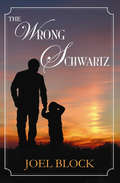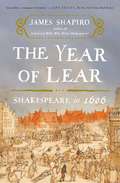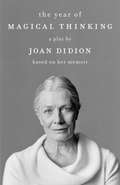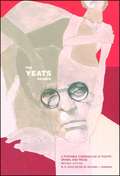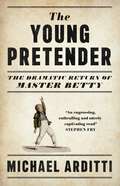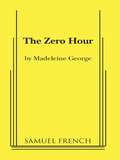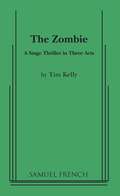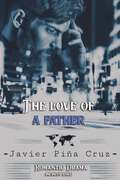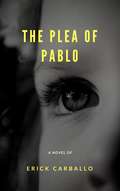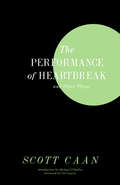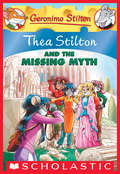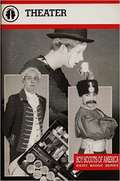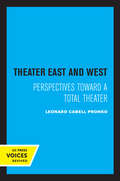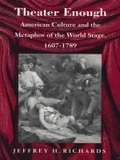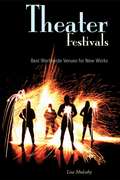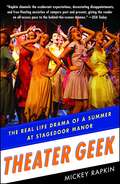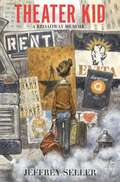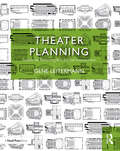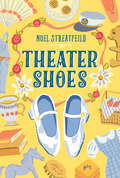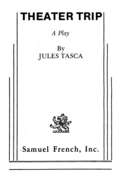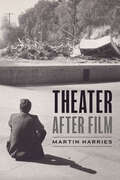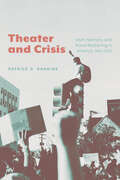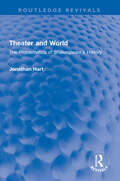- Table View
- List View
The Wrong Schwartz
by Joel BlockIt might have been just another messy marital triangle with routine melodrama: the stale marriage, the affair--his and hers--and the recriminations. But volatile passions intersected in a manner not unlike the coupling of an explosive and a detonator. Mark Shapiro is a handsome, enormously successful cardiac surgeon with a loving wife, an adoring son, plenty of money and a nightmare in the making. As successful as he is, he hungers for more notoriety and is drawn into believing a mysterious and alluring woman he has met will bring it to him. He also hungers for her. It is an out-of-control type of appetite, nothing short of sexual obsession. All marriages have ups and downs, but when Mark learns who "Mr. Tuesday" is, his wife's lover, his rage is not diminished by his own affair. One night, still irresistibly drawn to the other woman--whose promise has turned to horror--he learns more than he ever wanted to know about the palpable dangers of ambition.
The Year of Lear: Shakespeare in 1606
by James ShapiroPreeminent Shakespeare scholar James Shapiro shows how the tumultuous events in England in 1606 affected Shakespeare and shaped the three great tragedies he wrote that year--King Lear, Macbeth, and Antony and Cleopatra.In the years leading up to 1606, since the death of Queen Elizabeth and the arrival in England of her successor, King James of Scotland, Shakespeare's great productivity had ebbed, and it may have seemed to some that his prolific genius was a thing of the past. But that year, at age forty-two, he found his footing again, finishing a play he had begun the previous autumn--King Lear--then writing two other great tragedies, Macbeth and Antony and Cleopatra. It was a memorable year in England as well--and a grim one, in the aftermath of a terrorist plot conceived by a small group of Catholic gentry that had been uncovered at the last hour. The foiled Gunpowder Plot would have blown up the king and royal family along with the nation's political and religious leadership. The aborted plot renewed anti-Catholic sentiment and laid bare divisions in the kingdom. It was against this background that Shakespeare finished Lear, a play about a divided kingdom, then wrote a tragedy that turned on the murder of a Scottish king, Macbeth. He ended this astonishing year with a third masterpiece no less steeped in current events and concerns: Antony and Cleopatra. The Year of Lear sheds light on these three great tragedies by placing them in the context of their times, while also allowing us greater insight into how Shakespeare was personally touched by such events as a terrible outbreak of plague and growing religious divisions. For anyone interested in Shakespeare, this is an indispensable book.
The Year of Magical Thinking: The Play
by Joan Didion"This happened on December 30, 2003. That may seem a while ago but it won't when it happens to you ..." In this dramatic adaptation of her award-winning, bestselling memoir (which Michiko Kakutani in The New York Times called "an indelible portrait of loss and grief ... a haunting portrait of a four-decade-long marriage".) Joan Didion transforms the story of the sudden and unexpected loss of her husband and their only daughter into a stunning and powerful one-woman play. The first theatrical production of The Year of Magical Thinking opened at the Booth Theatre on March 29, 2007, starring Vanessa Redgrave and directed by David Hare.
The Yeats Reader, Revised Edition: A Portable Compendium of Poetry, Drama, and Prose
by Richard J. Finneran William Butler YeatsThroughout his long life, William Butler Yeats -- Irish writer and premier lyric poet in English in this century -- produced important works in every literary genre, works of astonishing range, energy, erudition, beauty, and skill. His early poetry is memorable and moving. His poems and plays of middle age address the human condition with language that has entered our vocabulary for cataclysmic personal and world events. The writings of his final years offer wisdom, courage, humor, and sheer technical virtuosity. T. S. Eliot pronounced Yeats "the greatest poet of our time -- certainly the greatest in this language, and so far as I am able to judge, in any language" and "one of the few whose history is the history of their own time, who are a part of the consciousness of an age which cannot be understood without them."The Yeats Reader is the most comprehensive single volume to display the full range of Yeats's talents. It presents more than one hundred and fifty of his best-known poems -- more than any other compendium -- plus eight plays, a sampling of his prose tales, and excerpts from his published autobiographical and critical writings. In addition, an appendix offers six early texts of poems that Yeats later revised. Also included are selections from the memoirs left unpublished at his death and complete introductions written for a projected collection that never came to fruition. These are supplemented by unobtrusive annotation and a chronology of the life.Yeats was a protean writer and thinker, and few writers so thoroughly reward a reader's efforts to essay the whole of their canon. This volume is an excellent place to begin that enterprise, to renew an old acquaintance with one of world literature's great voices, or to continue a lifelong interest in the phenomenon of literary genius.
The Young Pretender
by Michael Arditti"An engrossing, enthralling and utterly captivating read, The Young Pretender tells a simply remarkable story with bounce, energy, wit, and lively authenticity . . . Michael Arditti's brilliant imaginative achievement offers high comedy, dark tragedy and everything between" STEPHEN FRY"The Young Pretender is an absolute joy - charming and funny, with the lightest hint of melancholy, and a wonderfully imaginative recreation of the Georgian theatre scene" KATE SAUNDERS"I loved how Arditti conjures...the smell of the theatre and the ghosts of these bygone players that haunt the stage...and the wonderful period details. Arditti wears his research so lightly" LARUSHKA IVAN-ZADEH, reviewing on Radio 4's FRONT ROW *****Mobbed by the masses, lionised by the aristocracy, courted by royalty and lusted after by patrons of both sexes, the child actor William Henry West Betty was one of the most famous people in Georgian Britain.At the age of thirteen, he played leading roles, including Romeo, Macbeth and Richard III, in theatres across the country. Prime Minister William Pitt adjourned the House of Commons so that its members could attend his debut as Hamlet at Covent Garden. Then, as rivals turned on him and scandal engulfed him, he suffered a fall as merciless as his rise had been meteoric."Arditti's voice as Betty is impeccable. He is touchy, sometimes myopic, sincere in his ambitions. His attempts to reclaim lost glory are run through with an affecting melancholy" The TimesThe Young Pretender takes place during Betty's attempted comeback at the age of twenty-one. As he seeks to relaunch his career, he is forced to confront the painful truths behind his boyhood triumphs. Michael Arditti's revelatory new novel puts this long forgotten figure back in the limelight. In addition to its rich and poignant portrait of Betty himself, it offers an engrossing insight into both the theatre and society of the age. The nature of celebrity, the power of publicity and the cult of youth are laid bare in a story that is more pertinent now than ever."Entrancing and disturbing" ALLAN MASSIE, The Scotsman"Michael Arditti tells a story of a Regency child star with great panache and compassion, bringing a forgotten celebrity back to life for the modern age. A compelling read I was sad to finish." LINDA GRANT"Michael Arditti is a writer who takes risks. His material is always compelling and provocative, his techniques sophisticated and oblique" PATRICIA DUNCKER, Independent on Sunday "Arditti is a master storyteller" PETER STANFORD, Observer
The Young Pretender
by Michael Arditti"An engrossing, enthralling and utterly captivating read, The Young Pretender tells a simply remarkable story with bounce, energy, wit, and lively authenticity . . . Michael Arditti's brilliant imaginative achievement offers high comedy, dark tragedy and everything between" STEPHEN FRY"The Young Pretender is an absolute joy - charming and funny, with the lightest hint of melancholy, and a wonderfully imaginative recreation of the Georgian theatre scene" KATE SAUNDERS"I loved how Arditti conjures...the smell of the theatre and the ghosts of these bygone players that haunt the stage...and the wonderful period details. Arditti wears his research so lightly" LARUSHKA IVAN-ZADEH, reviewing on Radio 4's FRONT ROW *****"A vivid, highly detailed portrait of life in rumbustious Regency London" Mail on SundayMobbed by the masses, lionised by the aristocracy, courted by royalty and lusted after by patrons of both sexes, the child actor William Henry West Betty was one of the most famous people in Georgian Britain.At the age of thirteen, he played leading roles, including Romeo, Macbeth and Richard III, in theatres across the country. Prime Minister William Pitt adjourned the House of Commons so that its members could attend his debut as Hamlet at Covent Garden. Then, as rivals turned on him and scandal engulfed him, he suffered a fall as merciless as his rise had been meteoric."Arditti's voice as Betty is impeccable. He is touchy, sometimes myopic, sincere in his ambitions. His attempts to reclaim lost glory are run through with an affecting melancholy" The TimesThe Young Pretender takes place during Betty's attempted comeback at the age of twenty-one. As he seeks to relaunch his career, he is forced to confront the painful truths behind his boyhood triumphs. Michael Arditti's revelatory new novel puts this long forgotten figure back in the limelight. In addition to its rich and poignant portrait of Betty himself, it offers an engrossing insight into both the theatre and society of the age. The nature of celebrity, the power of publicity and the cult of youth are laid bare in a story that is more pertinent now than ever."Entrancing and disturbing" ALLAN MASSIE, The Scotsman"Michael Arditti tells a story of a Regency child star with great panache and compassion, bringing a forgotten celebrity back to life for the modern age. A compelling read I was sad to finish." LINDA GRANT"Michael Arditti is a writer who takes risks. His material is always compelling and provocative, his techniques sophisticated and oblique" PATRICIA DUNCKER, Independent on Sunday "Arditti is a master storyteller" PETER STANFORD, Observer
The Zero Hour
by Madeleine GeorgeCharacters: 1 male, 2 femaleUnit SetRebecca and her chronically unemployed butch girlfriend, O, have created a happy nest in their run-down walk-up in Queens, but things are starting to unravel. The more O pushes Rebecca to stop hiding their relationship, the more Rebecca's work life-writing a textbook for seventh graders about the Holocaust- begins to bleed into her personal life: She starts meeting World War II Nazis on the 7 train, passing as hipster professionals in New York City but hungry to come out about who they really are. Back home in Queens, O is also sparring with convincingly real visions: her long estranged-and recently dead?-mother keeps showing up to argue with her about her choices. This almost-love story explores the relationship between honesty and cruelty: How do you tell the truth about yourself when that truth might devastate the people you love? A tour-de-force for two actors playing eight different roles."A lucid drama. Appealingly brainy and messy, George's play never settles for an easy metaphor or emotion. It cross-examines our pat notions of history and love."- The New Yorker"Grabs our interest from its first provocative line. The Zero Hour is a work to savor."- Back Stage"Bold, thoughtful, and incredibly beautiful." - CurtainUp"A striking new play. Refreshingly original." -TheatreMania
The Zombie
by Tim KellyThis is a comedy thriller in a weird and sinister setting the Okefenokee Swamp in Florida where voodoo practices are accepted. In a decayed mansion dripping with cobwebs and mystery, a former carnival hypnotist calling himself Baron Samedi and a crooked sheriff have developed an "unusual" business. They turn illegal immigrants, petty criminals and intruders into zombies and lease them out as farm laborers. Profits and success aren't enough, however. The hypnotist wants revenge against those who have wronged him in the past. Soon the house is shaking with thrills, shivering shocks, and a startling climax. For the young television producer and his two girls friends who stumble onto the grim proceedings, it's a night to remember, especially when they encounter "The Walking Dead". Despite the goosebumps, this chiller is loaded with genuine comedy and keeps its audience in a state of taut excitement and laughter. The roles are fun and production needs are simple.
The love of a father (Infinite Love #1)
by Javier Piña CruzLove is a simile of pain… Every now and then, love shatters uswithin our heart, in pieces of apuzzle we are incapable of fitting again until that long lost piece missing, appears, enters your life and, without knowing how, you are fulfilled again. I am called Daniel and I learnt the feeling when your heart is crushed and at the same time, the happiness thanks to Náyade, my child and world. Due to this, time was the only witness of my scars, and when I thought I was going down again, love held me to teach me, once again, to be strong. My history is part of life, and life is no hallway of roses. There was a time that, for me, all was a chaos of events which almost cracked me, cause hell broke lose and wanted to tear apart me from what the love of a father means.
The plea of Pablo
by Erick Carballo"The plea of Pablo" is a novel in which the loneliness, bullying, vice and selfishness of a father are intertwined, and the indifference of a mother who abandons her son to his fate to start a new life with a man who assures you a promising future. Pablo is an eight-year-old boy who has only one friend he can trust, but a series of events lead him to a tragic destiny.
The trace of the fire
by Claudio CalzoniThe trace of the fire by Claudio Calzoni The trace of the fire: from Notre Dame to the Mole Antonelliana. The trace of the fire There is a trace of the fire behind the death of so many people, the destruction of monuments that guard the memory of Humanity and a relic, the most important that Christianity has preserved for millennia. The chess game between Good and Evil has begun. The players move their pieces. Whoever puts the King in check will win. It is not easy to find but the trace of Fire is in the air...
ThePerformanceofHeartbreak
by Scott Caan Val Lauren Robert CarnegieA collection of eleven one-act plays. With hints of Samuel Beckett, Sam Shepard, Neil LaBute, and Tracy Letts, Scott Caan grapples with the emotional interiors of people in a fractured world. Whether writing about actors, lovers, or co-workers, Caan takes on the complicated tension between what we say and what we feel, how we grapple with the world publicly and privately, and what that difference says about us as people. Caan's training as an actor imbues his words with a sense of play and the characters he leaves other actors to create within these plays are deep and open to interpretation. The Performance of Heartbreak and Other Plays is the introduction of an exciting new voice in American theater.
Thea Stilton and the Missing Myth: A Geronimo Stilton Adventure (Thea Stilton Graphic Novels #20)
by Thea StiltonJoin Thea Stilton and the Thea Sisters on an adventure packed with mystery and friendship! <p><p> While on vacation in Greece, the Thea Sisters make friends with a company of actors who are rehearsing for a play that's about to open. When an actress sprains her ankle, Colette ends up standing in for her! But suddenly, right before the performance, the lead actor goes missing. Can the mouselets find him in time for the show to go on? <p><i>Advisory: Bookshare has learned that this book offers only partial accessibility. We have kept it in the collection because it is useful for some of our members. To explore further access options with us, please contact us through the Book Quality link on the right sidebar. Benetech is actively working on projects to improve accessibility issues such as these.</i>
Theater (Merit Badge Series)
by Boy Scouts of AmericaBook about the importance in the elements of theater: writing, acting, costumes, makeup, etc.
Theater East and West: Perspectives Toward a Total Theater
by Leonard C. PronkoThis title is part of UC Press's Voices Revived program, which commemorates University of California Press’s mission to seek out and cultivate the brightest minds and give them voice, reach, and impact. Drawing on a backlist dating to 1893, Voices Revived makes high-quality, peer-reviewed scholarship accessible once again using print-on-demand technology. This title was originally published in 1967.
Theater Enough: American Culture and the Metaphor of the World Stage, 1607–1789
by Jeffrey H. RichardsThe early settlers in America had a special relationship to the theater. Though largely without a theater of their own, they developed an ideology of theater that expressed their sense of history, as well as their version of life in the New World. Theater Enough provides an innovative analysis of early American culture by examining the rhetorical shaping of the experience of settlement in the new land through the metaphor of theater.The rhetoric, or discourse, of early American theater emerged out of the figures of speech that permeated the colonists' lives and literary productions. Jeffrey H. Richards examines a variety of texts--histories, diaries, letters, journals, poems, sermons, political tracts, trial transcripts, orations, and plays--and looks at the writings of such authors as John Winthrop and Mercy Otis Warren. Richards places the American usage of theatrum mundi--the world depicted as a stage--in the context of classical and Renaissance traditions, but shows how the trope functions in American rhetoric as a register for religious, political, and historical attitudes.
Theater Festivals: Best Worldwide Venues for New Works
by Lisa MulcahyHere is the bible of theater festivals for any stage professional looking to showcase original work, full of expert tips on selecting festivals that are best suited to an individual's work. This directory of more than 50 festivals in the United States, Canada, and abroad covers every step of festival participation, including contact information, application requirements, auditions and tryout performances, face-to-face meetings and interviews, salary specifics, and performance space details. Serving as a full business primer, it also answers essential questions on negotiating and networking with producers, meeting casting obligations, and what responsibilities one has to a festival when his or her show goes on to become a hit.
Theater Geek: The Real Life Drama of a Summer at Stagedoor Manor, the Famous Performing Arts Camp
by Mickey RapkinWhat do Natalie Portman, Robert Downey, Jr., Zach Braff, and Mandy Moore have in common? Before they were stars, they were campers at Stagedoor Manor, the premier summer theater camp for children and teenagers. Founded in 1975, Stagedoor continues to attract scores of young performers eager to find kindred spirits, to sing out loud, to become working actors--or maybe even stars. Every summer for the past thirty-five years, a new crop of campers has come to the Catskills for an intense, often wrenching introduction to professional theater. (The camp produces thirteen full-scale productions during each of its three sessions.) These kids come from varying backgrounds--the offspring of Hollywood players from Nora Ephron to Bruce Willis work alongside kids on scholarship. Some campers have agents, others are seeking representation. When Mickey Rapkin, a senior editor at GQ and self-proclaimed theater fanatic, learned about this place, he fled Manhattan for an escape to upstate New York. At Stagedoor, he tracked a trio of especially talented and determined teen actors through their final session at camp. Enter Rachael Singer, Brian Muller, and Harry Katzman, three high school seniors closing out their sometimes sheltered Stagedoor experiences and graduating into the real world of industry competition and rejection. These veteran campers--still battling childhood insecurities, but simultaneously searching for that professional gig that will catapult them to fame--pour their souls into what might be their last amateur shows. Their riveting stories are told in Theater Geek, an eye-opening, laugh-out-loud chronicle full of drama and heart, but also about the business of training kids to be professional thespians and, in some cases, child stars. (The camp has long acted as a farm system for Broadway and Hollywood, attracting visits from studio executives and casting directors.) Via original interviews with former and current campers and staff--including Mandy Moore, Zach Braff, and Jon Cryer--Rapkin also recounts Stagedoor Manor's colorful, star-studded history: What was Natalie Portman's breakout role as a camper? What big-time Hollywood director, then barely a teenager, dated a much older Stagedoor staff member? Why did Courtney Love (at Stagedoor visiting her daughter) get into an argument with a hot dog vendor who had set up shop at the camp? Theater Geek leads readers through the triumphs and tragedies of the three senior campers' final summer in an absorbing, thought-provoking narrative that reveals the dynamic and inspiring human beings who populate this world. It also explores what the proliferation of theater camps says about our celebrity-obsessed youth and our most basic but vital need to fit in. Through the rivalry, heartbreak, and joy of one summer at Stagedoor Manor, Rapkin offers theater geeks of all ages a dishy, illuminating romp through the lives of serious child actors. Rich, insightful, and thoroughly entertaining, Theater Geek pulls back the curtain on an elite and intriguing world to reveal what's really at its core: children who simply love to perform.
Theater Kid: A Broadway Memoir
by Jeffrey SellerA coming-of-age tale from one of the most successful American producers of our time, Jeffrey Seller, who is the only producer to have mounted two Pulitzer Prize–winning musicals—Hamilton and Rent. Before he was producing the musical hits of our generation, Jeffrey was just a kid coming to terms with his adoption, trying to understand his sexuality, and determined to escape his dysfunctional household in a poor neighborhood just outside Detroit. We see him find his voice through musical theater and move to New York, where he is determined to shed his past and make a name for himself on Broadway. But moving to the big city is never easy—especially not at the height of the HIV/AIDS crisis—and Jeffrey learns to survive and thrive in the colorful and cutthroat world of commercial theatre. From his early days as an office assistant, to meeting Jonathan Larson and experiencing the triumph and tragedy of Rent, to working with Lin-Manuel Miranda on In the Heights and Hamilton, Jeffrey completely pulls back the curtain on the joyous and gut-wrenching process of making new musicals, finding new audiences, and winning a Tony Award—all the while finding himself. Told with Jeffrey&’s candid and captivating voice, Theater Kid is a gripping memoir about fighting through a hardscrabble childhood to make art on one&’s own terms, chasing a dream against many odds, and finding acceptance and community.
Theater Planning: Facilities for Performing Arts and Live Entertainment
by Gene LeitermannThis book introduces the concepts of theater planning, and provides a detailed guide to the process and the technical requirements particular to theater buildings. Part I is a guide to the concepts and practices of architecture and construction, as applied to performing arts buildings. Part II is a guide to the design of performing arts buildings, with detailed descriptions of the unique requirements of these buildings. Each concept is illustrated with line drawings and examples from the author’s extensive professional practice. This book is written for students in Theatre Planning courses, along with working practitioners.
Theater Shoes (The Shoe Books #3)
by Noel StreatfeildThree orphans are forced to enter a theater school by their grandmother, a famous actress. Unable to pay the tuition, they are given scholarships from the now-grown orphans from Ballet Shoes. Will they be able to live up to their patrons’ legacies? The children are ready to run away—until they discover their hidden talents. Originally published in 1945.
Theater Trip
by Jules TascaComedy / 2m, 1f / 1 set / In this existential comedy an actor in a one character play pleads with the author to give him a mate. The results are so disastrous that the author must enter the play to resolve the chaos. He is forced to resolve the plot in a way that a boy meets girl play has never before ended.
Theater after Film
by Martin HarriesA study of the impact of film and mass culture on drama after World War II. In Theater after Film, Martin Harries argues that after 1945, as cinema became omnipresent in popular culture, theater had to respond to cinema’s hegemony. Theater couldn’t break that hegemony, but it could provide a zone of contestation. Theater made film’s domination of the cultural field visible through hyperbole, refusal, and other strategies, thereby unsettling its power. Postwar theatrical experiment, Harries shows, often channeled and represented film’s mass cultural force, while knowing that it could never possess that force. Throughout the book, Harries brings critical theory into contact with theories of performance. Although Theater after Film treats the theatrical work of many figures, its central focus falls on Tennessee Williams, Samuel Beckett, and Adrienne Kennedy. Discussions of these dramatists consider their ways of addressing spectators, the politics of race between film and theater, and the place of the theatrical apparatus. Readings of these central figures in twentieth-century theater exemplify the book’s historical engagement with the media surround that drama confronted. This confrontation, Harries shows, was central to the development of some of the most continually compelling postwar drama.
Theater and Crisis: Myth, Memory, and Racial Reckoning in America, 1964-2020
by Patrice D. RankineRacial reckoning was a recurrent theme throughout the summer of 2020, a response to George Floyd’s murder and the unprecedented impact of COVID on marginalized groups. Theater and Crisis proposes a literary and theatrical study of how Floyd's killing could possibly happen in the aftermath of the Civil Rights era, and in the supposedly post-racial era following the election of Barack Obama. In the days and months following Floyd's death, there were nightly protests in streets across the United States and broader world. At the same time, theater performances were forced to shift online to video conferencing platforms and to find new ways to engage audiences. In each case, groups made shared meaning through storytelling and narrative, a liberatory process of myth-making and reverence that author Patrice D. Rankine calls “epiphanic encoding.” Rather than approaching the problem of racial reckoning through history, where periodization and progress are dominant narratives, Theater and Crisis argues that myth and memory allow for better theorization about recurring events from the past, their haunting, and what these apparent ghosts ask of us. Building on the study of myth as active, processual storytelling, Rankine acknowledges that it grounds and orients groups toward significant events. Theater and Crisis aligns narratives about Emmett Till, Trayvon Martin, and George Floyd, among others, with ancient, mythic figures such as Christ, Dionysus, Oedipus, and Moses. As living and verbal visitations, these stories performed on stage encode the past through their epiphanies in the present, urging audiences toward shared meaning. Rankine traces the cyclical hauntings of race through the refiguring of mythic stories across the past 75 years in the plays of James Baldwin, Ntozake Shange, Antoinette Nwandu, and many more, and in response to flashpoints in US racial history, such as the 1955 lynching of Emmett Till, the upheavals of the 1960s and 1970s, the wars on drugs and crime, and the continued violence against and disenfranchisement of Black people into the twenty-first century. Theater and Crisis explores the appearance of myth on the American stage and showcases the ongoing response by the theatrical establishment to transform the stage into a space for racial reckoning. This timely book is essential reading for scholars of theater studies, classics, and American studies.
Theater and World: The Problematics of Shakespeare's History (Routledge Revivals)
by Jonathan HartFirst published in 1992, Theater and World is a detailed exploration of Shakespeare’s representation of history and how it affects the relation between theatre and world. The book focuses primarily on the Second Tetralogy (Richard II, Henry IV Part I, Henry IV Part II, and Henry V) and includes a wealth of analysis and interpretation of the plays. In doing so, it explores a wide range of topics, including the relation between literary and theatrical representations and the world; the nature of illusion and reality; genre; the connection between history and fiction (especially plays); historiography and literary criticism or theory; poetry and philosophy; and irony, both rhetorical and philosophical. Theater and World continues to have lasting relevance for anyone with an interest in Shakespeare’s words and his representation of history in particular.
